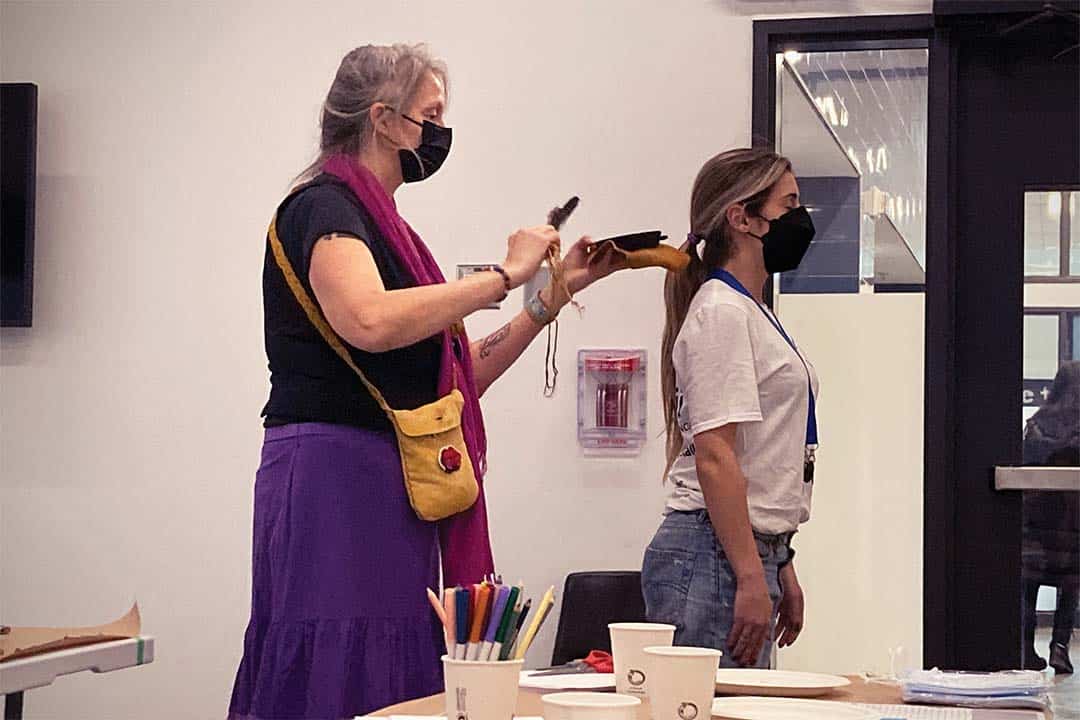Each year, the University of Toronto Students’ Union (UTSU) hosts eXpression Against Oppression (XAO), a week of events that celebrate U of T’s diversity and facilitate discussions of oppression on campus and in the broader world. This year’s XAO took place from November 21 to 28 and included events such as a Multicultural Bazaar, where students learned about various cultural clubs; an antiracism panel featuring dumplings from around the world; and Palestinian Solidarity day, planned in collaboration with the SCSU. The Varsity attended two XAO events: an intuitive art workshop with Indigenous teachings and the screening of a documentary about human rights abuses in the Xinjiang province of China.
Indigenous art and smudging
On November 22, Veronica Johnny led a smudging ceremony and workshop on Indigenous art as part of XAO. Johnny, a Cree and Dene multidisciplinary artist, is the founder of IndigenEd, an organization that spreads Indigenous female voices through art-focused educational initiatives. During the workshop, Johnny focused on providing a healing space for the participants through art, music, and ceremony.
Smudging, which involves burning various medicinal plants, is an Indigenous cultural practice used to cleanse, offer thanks, and connect to the earth. After introducing herself to each person individually, Johnny combined sweetgrass, sage, and cedar in a small cast iron frying pan.
According to Johnny, Indigenous people in Alberta began using pans instead of traditional bowls in smudging ceremonies to avoid detection from the colonial government, which banned Indigenous peoples from engaging in ceremonies from 1895–1951. “Even in times of genocide, where they were killing us and hunting us, we were still using our medicines [in secret] and passing it on,” said Johnny.
One by one, participants were invited to waft the smoke around themselves while centering on their hopes. “When the person is smudging, we want to send them our good energy,” said Johnny.
Following the ceremony, Johnny spoke about Indigenous art and its role in providing healing. She shared a story from Duke Redbird — an Elder from the Saugeen First Nation — about Norval Morrisseau, a nationally renowned Anishinaabe artist. According to Redbird, Morrisseau would sit in parks, and when he saw a passerby who needed healing, he would sketch a picture and gift it to them, as if he was giving a prescription.
“Indigenous art is not about painting what we see… it’s about painting what we don’t see,” she said. “[Morrisseau] would give [passersby] things that they needed to see.” With the intention of fostering healing, participants intuitively drew and painted against the backdrop of Johnny’s singing.
Throughout the workshop, Johnny highlighted the importance of learning from Indigenous peoples. “[Colonizers] thought we were less than, when we were actually really connected nation[s]… who had been caretakers [of the land] since time immemorial,” she said. “I just love to think about what life would be like if we were actually heard.”
The Varsity spoke with attendees, who highlighted the illuminating and healing effect of the event. Owen Thompson, an Anishinaabe participant and student in the School of Continuing Studies, highlighted the unique environment Johnny had created. “It’s not every day that you get the opportunity to go out and have someone, especially an Elder, smudge you… and put your effort and time into creative works in a relatively safe environment,” he said.
Documentary screening
On Friday, November 25, the UTSU screened In Search of My Sister, a documentary following Uyghur activist Rushan Abbas and her journey to uncover the truth behind her sister’s disappearance. The screening was followed by a panel discussion with Jawad Mir, the film’s director, and Samer Zuberi, MP and chair of Parliament’s Subcommittee on International Human Rights. Mir and Zuberi spoke at length on human rights abuses in Xinjiang, the Canadian government’s responses, and the role of demonstrations and activism in raising awareness.
The government of the People’s Republic of China is targeting the Uyghur population in China’s Xinjiang province with discriminatory surveillance, cultural and religious persecution, and genocide. Leaked documents and activists have revealed the existence of massive labour camps where systematic human rights abuses occur. In August, a report by the Office of the UN High Commissioner of Human Rights found that arbitrary detention of Uyghurs in Xinjiang “may constitute international crimes, in particular crimes against humanity.”
In an interview with The Varsity, Mir focused on hypocrisy from Western corporations, including Apple, Nike, and the NBA. Mir called out “selective outrage,” arguing that Western companies are quick to speak out about feminism and transgender rights but stay silent on forced labour in Xinjiang. Companies that refuse to stop doing business in Xinjiang, Mir said, are “complicit in genocide.”
Zuberi called for Canada to do what it can to support the Uyghur community through humanitarianism. He plans to introduce a motion in Parliament to resettle 10,000 Uyghur refugees in Canada. He also supports increasing sanctions on the officials responsible for atrocities and aims to bring change through public awareness.
Zuberi also endorsed calls to “cleanse our supply chains.” In an interview with The Varsity, he cautioned against “unknowingly supporting the unspeakable,” warning that Canadian businesses are invested in Xinjiang. Large quantities of tomato products, cotton, and materials for solar panels are sourced from Xinjiang, potentially with connections to forced labour.
According to Zuberi, U of T students should “think about the products that they buy.”
“We cannot underestimate how our actions can create positive change,” said Zuberi.


